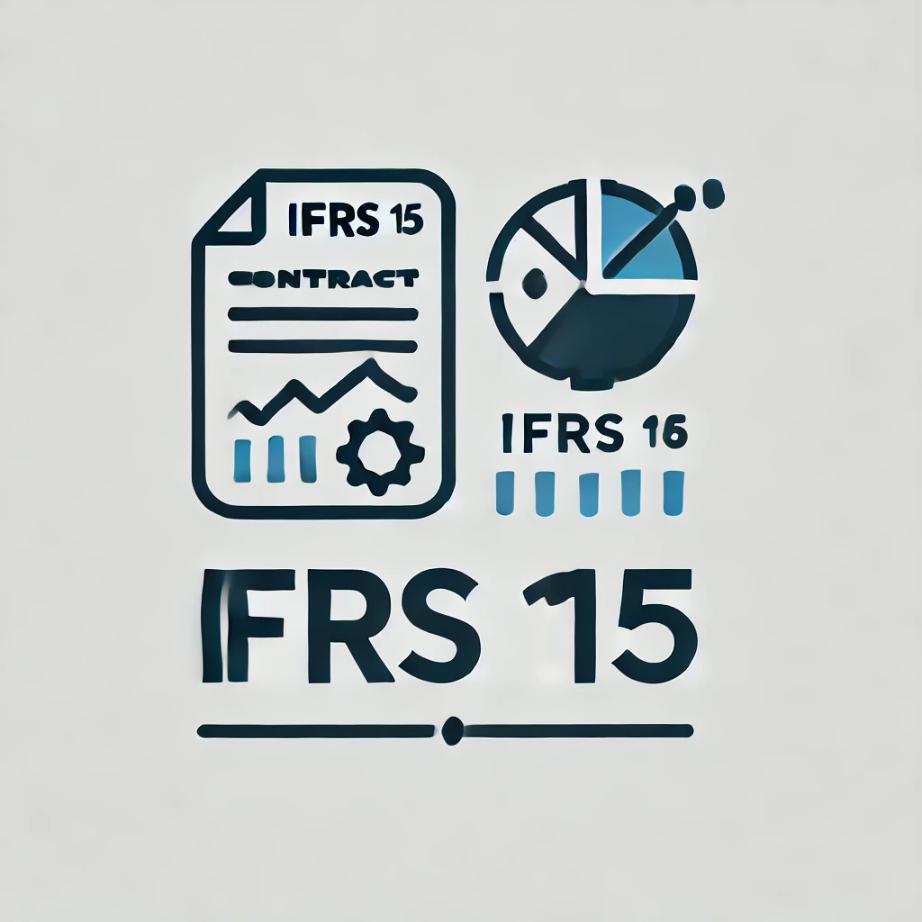IFRS15(収益認識基準)について、重要かつ基本的な内容を、英語と和訳で紹介していきます。繰り返すことで、IFRS15の復習になり会計基準の基本が身につくうえ、ビジネス英語・英会話の能力があがるので一石二鳥です。
例文
- The core principle of IFRS 15 is to recognize revenue when the control of goods or services is transferred to the customer.
IFRS 15の核心となる原則は、商品またはサービスの支配が顧客に移転されたときに収益を認識することです。 - The five-step model in IFRS 15 helps entities determine when and how much revenue to recognize.
IFRS 15の5ステップモデルは、収益をいつ、いくら認識するかを企業が決定するのに役立ちます。 - Step one involves identifying the contract with a customer.
ステップ1では、顧客との契約を識別します。 - In step two, performance obligations within the contract are identified.
ステップ2では、契約内の履行義務を識別します。 - Step three requires determining the transaction price.
ステップ3では、取引価格を決定する必要があります。 - Step four allocates the transaction price to the performance obligations in the contract.
ステップ4では、取引価格を契約の履行義務に割り当てます。 - Finally, in step five, revenue is recognized when a performance obligation is satisfied.
最後に、ステップ5では、履行義務が満たされたときに収益を認識します。 - A contract is an agreement between two or more parties that creates enforceable rights and obligations.
契約とは、法的に強制力のある権利と義務を生じさせる二者以上の間の合意です。 - Performance obligations are promises in a contract to transfer goods or services to a customer.
履行義務とは、顧客に商品やサービスを移転することについての契約における合意です。 - The transaction price is the amount of consideration to which an entity expects to be entitled in exchange for transferring promised goods or services.
取引価格とは、企業が約束された商品やサービスを移転する見返りに受け取ると予想される対価の額です。 - Variable consideration should be estimated and included in the transaction price if it is probable that a significant reversal will not occur.
変動対価は、重要性のある反対の影響をあたえる事象が発生しないと予測される場合、(合理的に)見積もられて取引価格に含まれるべきです。 - Entities must consider any constraints on variable consideration.
企業は変動対価に対する制約を考慮しなければなりません。 - The transaction price is allocated to each performance obligation based on the relative standalone selling prices.
取引価格は、相対的な個別販売価格に基づいて各履行義務に割り当てられます。 - Revenue is recognized when control of the goods or services is transferred to the customer.
収益は、商品やサービスの支配が顧客に移転されたときに認識されます。 - Control of an asset refers to the ability to direct the use of and obtain substantially all of the remaining benefits from the asset.
資産の管理とは、資産の使用を指示し、その資産から実質的にすべての残りの利益を取得する能力を指します。 - A performance obligation is satisfied over time if one of the criteria in IFRS 15 is met.
IFRS 15における一定の基準を満たす場合、履行義務は時間の経過とともに満たされます。 - Entities must recognize revenue over time by measuring the progress toward complete satisfaction of the performance obligation.
企業は、履行義務の完全な履行に向けた進捗を測定することにより、収益を時間の経過とともに認識しなければなりません。 - Output methods and input methods can be used to measure progress toward satisfaction of a performance obligation.
アウトプット法もインプット法も、履行義務の満足度に向けた進捗を測定するために使用できます。 - An entity recognizes revenue at a point in time if a performance obligation is satisfied at that point.
企業は、ある時点で履行義務が満たされた場合、その時点で収益を認識します。 - Revenue recognition at a point in time often involves the transfer of control of goods or services to the customer.
ある一定時点での収益認識は、多くの場合、商品やサービスの支配の顧客への移転を伴います。 - IFRS 15 requires disclosure of sufficient information to enable users of financial statements to understand the nature, amount, timing, and uncertainty of revenue and cash flows.
IFRS 15は、財務諸表の利用者が収益およびキャッシュフローの性質、金額、タイミング、および不確実性を理解できるようにするための十分な情報開示を求めています。 - Entities must disclose the disaggregation of revenue into categories that depict how revenue is affected by economic factors.
企業は、収益を、経済要因によってどのように収益が影響を受けるかを示すカテゴリーに区分して開示しなければなりません。 - Contract assets and contract liabilities must be presented separately in the statement of financial position.
契約資産および契約負債は、財務諸表において別々に表示しなければなりません。 - Entities must disclose information about significant judgments and changes in judgments that affect the determination of the amount and timing of revenue from contracts with customers.
企業は、顧客との契約からの収益の金額と収益認識時点の決定に影響を与える重要な判断および判断の変更に関する情報を開示しなければなりません。 - The cost to obtain a contract should be recognized as an asset if the cost is expected to be recovered.
契約を取得するための費用は、回収が予想される場合、資産として認識されるべきです。 - IFRS 15 specifies that the incremental costs of obtaining a contract must be capitalized if they are expected to be recovered.
IFRS 15は、契約を取得するための増分費用が回収されると予想される場合、それらを資産計上する必要があると規定しています。 - Costs to fulfill a contract should be recognized as an asset if they meet certain criteria.
契約を履行するための費用は、一定の基準を満たす場合、資産として認識されるべきです。 - Entities must amortize the capitalized costs to obtain and fulfill a contract on a systematic basis.
企業は、契約を取得および履行するために要した費用として資産計上された費用は、体系的に償却しなければなりません。 - Transitioning to IFRS 15 may require significant changes to systems, processes, and controls.
IFRS 15への移行は、システム、プロセス、および管理の大幅な変更を必要となる場合があります。 - Entities must consider the effects of IFRS 15 on their financial statements and disclosures.
企業は、IFRS 15が財務諸表および開示に与える影響を考慮しなければなりません。 - Implementation of IFRS 15 requires coordination across various departments including finance, legal, IT, and sales.
IFRS 15の導入にあたっては、財務、法務、IT、営業などのさまざまな部門間の調整が必要です。 - Entities need to update their accounting policies and procedures to comply with IFRS 15.
企業は、IFRS 15に準拠するために会計方針と手続きを更新する必要があります。 - Training programs may be necessary to ensure that staff understand the requirements of IFRS 15.
IFRS 15の要件を理解するためにスタッフのトレーニングプログラムが必要になるかもしれません。 - IFRS 15 emphasizes the importance of judgment in revenue recognition, especially in identifying performance obligations and determining transaction prices.
IFRS 15は、収益認識における判断の重要性を強調しており、特に履行義務の識別や取引価格の決定において重要になります。 - Entities must disclose qualitative and quantitative information about their contracts with customers.
企業は、顧客との契約に関する質的および量的な情報を開示しなければなりません。 - One significant area of focus in IFRS 15 is the timing of revenue recognition, which may differ from the timing under previous standards.
IFRS 15の重要な焦点の一つは収益認識のタイミングであり、これは以前の基準と異なる場合があります。 - Entities should document their revenue recognition policies and ensure they are consistently applied.
企業は収益認識方針を文書化し、一貫して適用されていることを確認する必要があります。 - IFRS 15 requires entities to reassess their contracts with customers regularly to ensure compliance.
IFRS 15は、顧客との契約を定期的に再評価して、基準に準拠していることを確保するように企業に求めています。 - Entities may need to use estimation techniques to determine the transaction price when variable consideration is involved.
変動対価が含まれる場合、取引価格を決定するために見積もり手法を使用する必要があるかもしれません。 - Entities must provide a reconciliation of the opening and closing balances of contract assets and liabilities.
企業は、契約資産および負債の期首残高と期末残高の調整結果を提供しなければなりません。 - The cost of fulfilling a contract includes direct labor, materials, and allocation of overhead costs.
契約を履行するための費用には、直接要した人件費、材料、および間接費の配分が含まれます。 - IFRS 15’s impact on financial reporting can affect an entity’s profitability ratios and key performance indicators.
IFRS 15が財務報告に与える影響は、企業の収益性比率や主要業績指標に及びます。 - Entities need to ensure that their IT systems can capture and report the necessary information under IFRS 15.
企業は、ITシステムがIFRS 15の下で必要な情報を入手し報告できるようになっていることを確保していく必要があります。 - Revenue recognition for long-term contracts can be particularly complex under IFRS 15.
IFRS 15の下では、長期契約の収益認識は特に複雑になる可能性があります。 - The adoption of IFRS 15 may require changes to financial statement presentation and disclosures.
IFRS 15の導入は、財務諸表の表示および開示の変更を必要とするかもしれません。 - Entities should assess the potential impact of IFRS 15 on their tax positions and deferred tax calculations.
企業は、IFRS 15が税金計算および繰延税金計算に与える潜在的な影響を評価しておくべきです。
IFRS15の概要
IFRS15の基本については、こちらの記事も参照してください!


